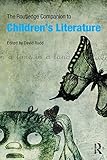
Price: £38.99
Publisher: Routledge
Genre: Non Fiction
Age Range: Books About Children's Books
Length: 336pp
- Edited by: David Rudd
The Routledge Companion to Children's Literature
David Rudd takes a novel and useful approach for his intended audience of undergraduate and postgraduate students. Concentrating on questions of textual analysis, rather than the more practical aspects of children’s literature (for instance, the role of children’s literature in education or how children themselves respond to texts) the book is in two related parts. The first part consists of a number of introductory discursive essays on aspects of the discipline, by leading figures in the field. Rudd himself offers a consideration of some key questions that have arisen from within the subject itself; Rod McGillis gives a sweeping view of some of the array of critical tools now on offer; John Stephens tackles narratology; and (stopping the name checking) there are equally authoritative introductions to gender, race and ethnicity, fantasy, realism, young adult fiction, picture books and comics and media adaptations, concluding with a chapter that picks up some loose ends. Throughout this first part, key concepts and influential figures are highlighted and then are individually elucidated in alphabetical order in the second part of the companion, which has almost as much space as the first part, and largely uses the same contributors, with Rudd seeming to take the lion’s share. This is the distinctive aspect of the book and will be immensely helpful to those who come relatively new to the subject and find themselves stumbling over terms they don’t understand. As a largely unreconstructed humanist and empiricist myself (terms of opprobrium in literary theory, although they can serve you quite well in a supermarket queue) there was a lot here that was clear and informative, as well as, inevitably, some that remained baffling to me even with the help of the best minds of my generation. There are, of course, some theories that just can’t be adequately summarised in a paragraph or two. The book concludes with a timeline of major events in the history of children’s literature, in which some of the trademark Rudd humour seeps through, and an excellent bibliography and index.



